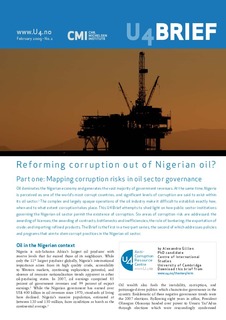Reforming corruption out of Nigerian oil? Part one: Mapping corruption risks in oil sector governance
Report
Permanent lenke
http://hdl.handle.net/11250/2474788Utgivelsesdato
2009-02-11Metadata
Vis full innførselSamlinger
- Publications [1488]
Originalversjon
Bergen: Chr. Michelsen Institute (U4 Brief 2009:2) 4 p.Sammendrag
Oil dominates the Nigerian economy and generates the vast majority of government revenues. At the same time, Nigeria is perceived as one of the world's most corrupt countries, and significant levels of corruption are said to exist within its oil sector. The complex and largely opaque operations of the oil industry make it difficult to establish exactly how, when and to what extent corruption takes place. This U4 Brief attempts to shed light on how public sector institutions governing the Nigerian oil sector permit the existence of corruption. Six areas of corruption risk are addressed: the awarding of licenses; the awarding of contracts; bottlenecks and inefficiencies; the role of bunkering; the exportation of crude; and importing refined products. The Brief is the first in a two-part series, the second of which addresses policies and programs that aim to stem corrupt practices in the Nigerian oil sector.
